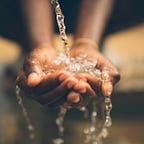How Helping the Poor Helps Us?
Our Cruel History as A Species
For most of human history, we have been hunters and gatherers. Its only recently that we have settled as farmers and started our civilization. Within that primitive civilization, resources were limited due to the size of land. If you wanted more resources, you had to conquer other lands, murder other people, and commit many other terrible evils. According to Kurzgesagt “Your neighbor's loss is your gain” (2018). You gain only if they suffer, that was the unfortunate truth of the past. Things are tremendously different now, yet we still have the same mindset as primitive civilizations.
How Are Things Different?
It all started with the industrial revolution, the greatest scientific innovation in human history. Everything changed from this point, without too much exaggeration, everything was MUCH BETTER for the human race. Within the video, a Selfish Argument for Making the World Better, the narrator, narrated “Then the industrial revolution happened and everything changed, we developed machinery, better crops, better fertilizers. Agriculture output skyrocketed, but we didn't just produce more food, every industrial sector exploded in terms of productivity” (2018). This is more of an understatement. All points of production went up to a much higher level than they would have ever been without the revolution. Better farming method lead to more food, quality fertilizer lead to more food and greater quality of food. The industrial output is hundreds of times better. For example, “the iron production in Britain from 1770 to 1870 multiplied 137x” (2018). An unimaginable amount of resources is now possible and at the use for humans.
How Do We Live Today?
In today's world, we’re at a positive sum when it comes to resources. This is a new idea, a positive sum. For most of history, it was a zero-sum game. We needed to take from others to gain. Now, we have so many resources, were at an excess. This excess is, unfortunately, going to waste when it could be going to the ones without resources. According to Margaret Rosso Grossman “Studies have estimated that between a third and half of food produced globally is not consumed, with environmental, economic, and social impacts.[ 1] Food loss and waste occur at various stages in the food supply chain: production, processing, wholesale and retail, food service, and consumer” (2020). We are losing more than a third of all food that we have available. A lot of this is due to negligence from companies, but a lot of it is also from people that are simply throwing food away. Food loss occurs at every stage and its unnecessary, cruel, and bad for the environment. Its not just food loss either, people are throwing away good clothing, computers, phones, etc.
I used to work for Dunkin. Every night, you were forced to throw away all the donuts and any other food leftover. I threw away about 200 pounds worth of food daily. This could have fed hundreds of hungry, poor, or even homeless people. We could be helping the poor but are choosing not to.
Ok, How Does Helping the Poor Help ME?
To put it simply, the better other people from random unknown countries are, the better your life is due to the law of supply and demand. Within the Kurzgesgat video, it was stated “In a positive-sum world, the more people are well off, the better your life is. This is because of the nature of innovation, it is fundamentally driven by supply and demand. The supply increases when more people have the freedom and education to contribute. They become researchers, engineers, inventors, or thinkers who come up with new ideas” (2018). Think of it like this. We live as humans not to fight and take from each other, its more of a team game. If they are well-off enough, they can contribute towards progressing the game for a better world. Everyone gains, this is simple economics. We could double our total world output if everyone is well-off as more than 3 billion people are not doing too good.
Kurzgesagt. (2018). A Selfish Argument for Making the World a Better Place — Egoistic Altruism. YouTube. Retrieved October 14, 2021, from https://www.youtube.com/watch?v=rvskMHn0sqQ.
Margaret Rosso Grossman. (2020). USA ∙ US Agency Cooperation to Reduce Food Loss and Waste. European Food and Feed Law Review, 15(2), 153–157.
